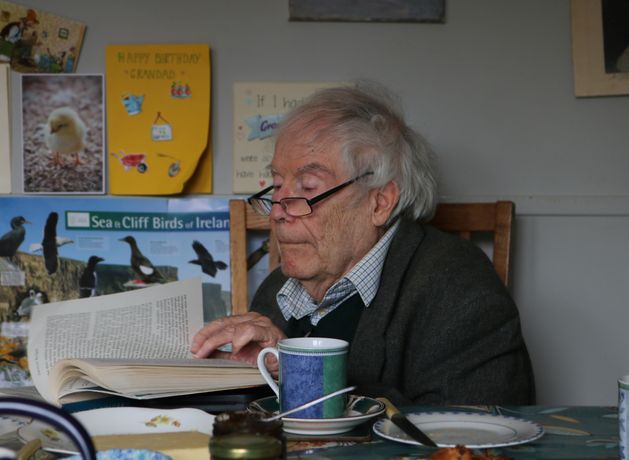Finlan was one of five children reared over a pub and grocery shop on Ardnaree hill in Ballina, Co Mayo. Unable to settle at the local St Muredach’s College secondary school, he was sent to Rockwell in Co Tipperary where he had an inspiring English teacher, took to the classics, and loved the cinema when back at home.
He joined the Western People newspaper in the summer of 1950, where he became firm friends with its GAA correspondent John Healy.
“Our workplace was nothing more than a bench in the case room on which were perched a couple of typewriters so old they might have been used to type the Dead Sea Scrolls,” Finlan said.
Western People editor James Laffey recalls that journalists did not use bylines back then, using pen names for sport. So Healy was ‘Kipper’ and Finlan was ‘Pembroke’ — a name he picked because he thought it was rugby-sounding and he wanted to make a point about the GAA ban on foreign games which he opposed.
Finlan reported on the All-Ireland Senior Football Final in 1950 between Mayo and Louth, but missed out on the memorable 1951 All-Ireland — Mayo’s last big success — as he had by then left to join Healy in the Irish News Agency (INA) in Dublin.
He was sent to Belfast by the INA in 1952 and again for The Irish Press, and then went to Canada where he spent 12 years in broadcasting with the Canadian Broadcasting Corporation and CTV Canada.
He was back in Ireland when he met a nurse, Marie Costello, from Skehana, Co Galway, at a party and told a friend that he was going to marry her — which he did.
He joined The Irish Times in 1969, where his friend Healy had been recruited by Douglas Gageby, then editor. Almost immediately he was sent to Belfast, where he had to employ his new-found North American twang to talk himself and colleagues Jack Fagan and Aengus Fanning out of a tight spot.
“Who do youse represent anyway?” a “tough-looking” loyalist in the Shankill had asked the trio.
“Luckily Fagan and Fanning sang dumb, realising that their Meath and Kerry accents could get us all lynched, and I replied in a supercharged transatlantic accent. ‘We’re from American television, here to cover the big story and in particular to get the Protestant angle on it’,” Finlan recalled.
Finlan served as Irish Times western correspondent from 1973 until his retirement in 1996, covering major news and arts. Galway Arts Festival founder Ollie Jennings recalled how encouraging Finlan was during their early years.
Former Irish Times editor Conor Brady said Finlan was “one of that cohort of journalists — many from the west — who brought a rugged integrity to Irish journalism”, having learned their trade in “the crucible of local newspapers” in the 1950s.
Many of them joined the Irish Press and “fought hard to maintain their independence and their loyalty to the truth,” Brady added.
“Management — and not just in The Irish Press — was harsh and intolerant. A word of complaint from a churchman or a Fianna Fáil politician could bring woeful consequences. Not a few migrated to Gageby’s Irish Times, including Healy and Finlan,” Brady recalled.
Michael Finlan is survived by his wife Marie, children Mary Rose, Michael and James and granddaughter Joyce.

